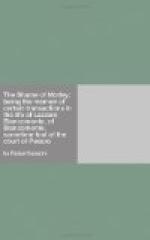The Lord Giovanni was a frequent visitor at the Convent of Santa Caterina, whither he went, ever attended by Filippo di Santafior, to pay his duty to his fair cousin. In the summer of 1500, she being then come to the age of eighteen, and as divinely beautiful a lady as you could find in Italy, she allowed herself to be persuaded by her brother—who, I make no doubt had been, in his turn, persuaded by the Lord of Pesaro—to leave her convent and her studies, and to take up her life at the Sforza Palace, where Filippo held by now a sort of petty court of his own.
And now it fell out that the Lord Giovanni was oftener at the Palace than at the Castle, and during that summer Pesaro was given over to such merrymaking as it had never known before. There was endless lute-thrumming and recitation of verses by a score of parasite poets whom the Lord Giovanni encouraged, posing now as a patron of letters; there were balls and masques and comedies beyond number, and we were as gay as though Italy held no Cesare Borgia, Duke of Valentinois, who was sweeping northward with his all-conquering flood of mercenaries.
But one there was who, though the very centre of all these merry doings, the very one in whose honour and for whose delectation they were set afoot, seemed listless and dispirited in that boisterous crowd. This was Madonna Paola, to whom, rumour had it, that her kinsman, the Lord Giovanni, was paying a most ardent suit.
I saw her daily now, and often would she choose me for her sole companion; often, sitting apart with me, would she unburden her heart and tell me much that I am assured she would have told no other. A strange thing may it have seemed, this confidence between the Fool and the noble Lady of Santafior—my Holy Flower of the Quince, as in my thoughts I grew to name her. Perhaps it may have been because she found me ever ready to be sober at her bidding, when she needed sober company as those other fools—the greater fools since they accounted themselves wise—could not afford her.
That winter adventure betwixt Cagli and Pesaro was a link that bound us together, and caused her to see under my motley and my masking smile the true Lazzaro Biancomonte whom for a little season she had known. And when we were alone it had become her wont to call me Lazzaro, leaving that other name that they had given me for use when others were at hand. Yet never did she refer to my condition, or wound me by seeking to spur me to the ambition to become myself again. Haply she was content that I should be as I sas, since had I sought to become different it must have entailed my quitting Pesaro, and this poor lady was so bereft of friends that she could not afford to lose even the sympathy of the despised jester.




